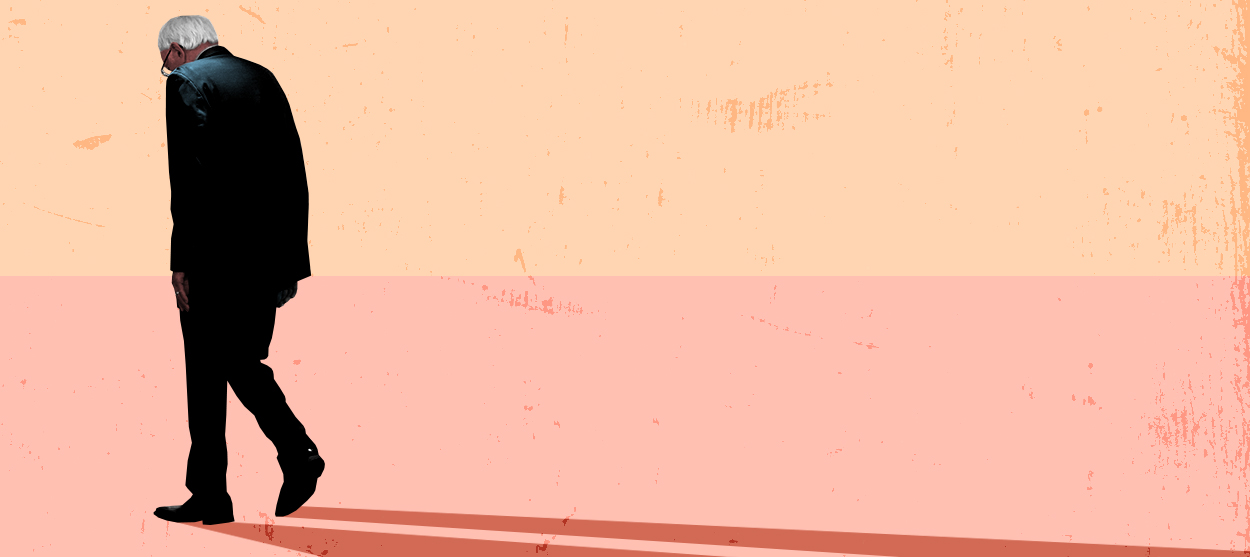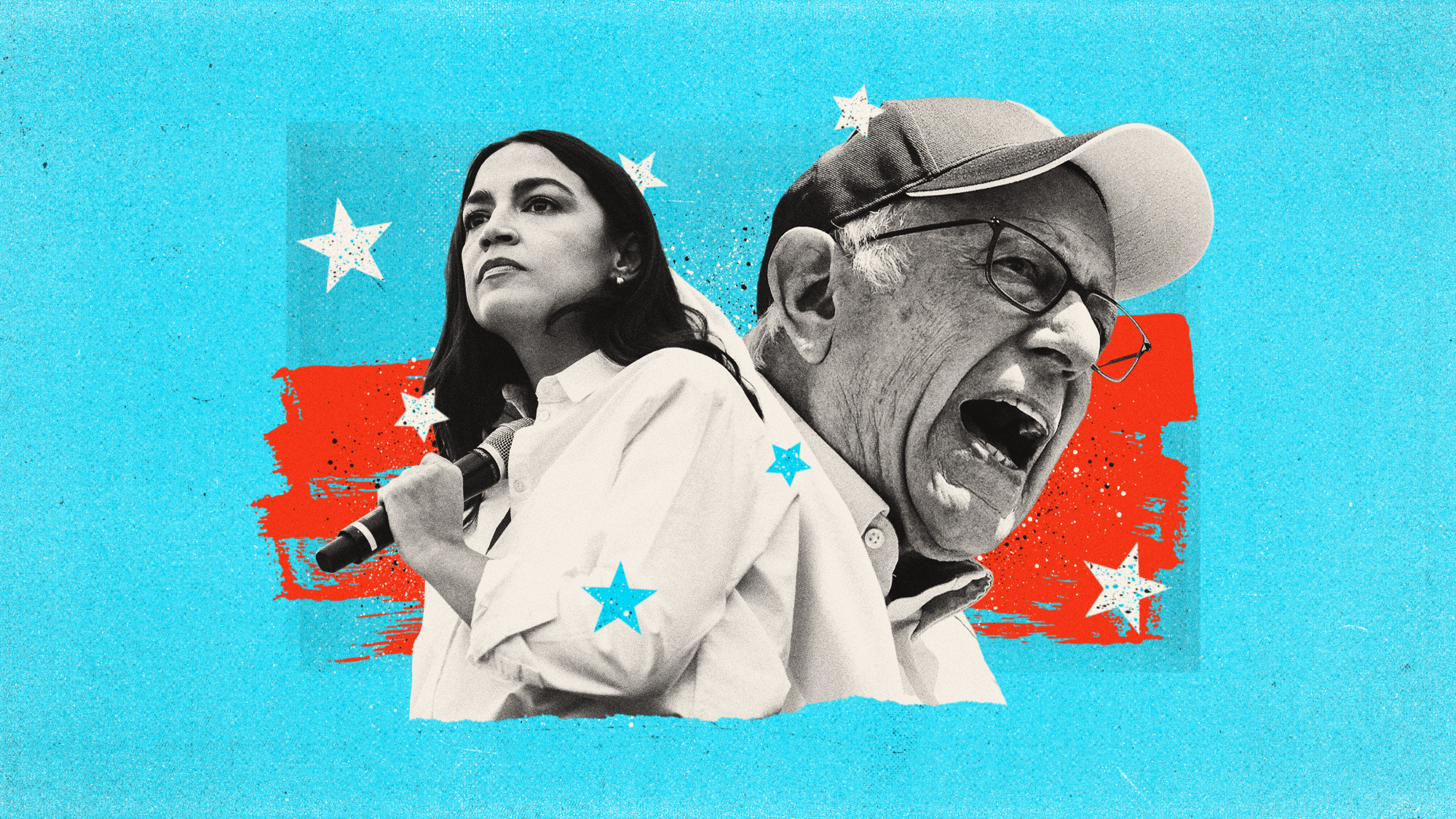Bernie Sanders didn't lose because his ideas were unpopular
He was too much of a threat to the Democratic establishment


A free daily email with the biggest news stories of the day – and the best features from TheWeek.com
You are now subscribed
Your newsletter sign-up was successful
For a few weeks, it seemed as though Bernie Sanders was really going to win the 2020 Democratic presidential primary. He won the most votes in all three of the first states, and was leading national polls. Opinion surveys showed that he was broadly popular among the Democratic electorate, and majorities of primary voters supported his signature ideas like Medicare-for-all.
But in a space of about three days, it all went sideways. Joe Biden won a smashing victory in South Carolina, all the other moderate candidates dropped out and endorsed him, and he went on to win convincingly across most Super Tuesday states. Sanders was set far back in the delegate race, and now, a little over a month later, he is suspending his campaign. The main reason he is not going all the way to the convention is surely the coronavirus pandemic, but the race was already effectively over anyway.
So what happened? A full campaign postmortem will of course have to wait for more detailed investigations and reporting. But there are a few factors that undoubtedly contributed to his loss — his age, lockstep opposition from the Democratic establishment, and a hostile mainstream media.
The Week
Escape your echo chamber. Get the facts behind the news, plus analysis from multiple perspectives.

Sign up for The Week's Free Newsletters
From our morning news briefing to a weekly Good News Newsletter, get the best of The Week delivered directly to your inbox.
From our morning news briefing to a weekly Good News Newsletter, get the best of The Week delivered directly to your inbox.
The most basic is age. Sanders would have been the oldest president ever inaugurated for a first term by a considerable margin. He also suffered a heart attack in October. The presidency is a demanding job, and all other things equal, of course voters will be hesitant to support an elderly candidate.
However, Sanders did not lose to some fresh-faced youngster. On the contrary, Joe Biden is only a year younger than Sanders, and has his own history of health problems, having suffered two brain aneurysms in the 1980s. What's more, unlike Sanders, Biden has very obviously shown signs of losing a step or two mentally. Interviews with him from just four years ago sound like a completely different person.
A second factor is Sanders' cranky loner personality. By his own admission he is not good at the personal side of politics. In an interview with The New York Times, he said, "I'm not good at backslapping. I'm not good at pleasantries … I take that as a little bit of a criticism, self-criticism. I have been amazed at how many people respond to, 'Happy Birthday!' 'Oh Bernie, thanks so much for calling.' It works. It’s just not my style." If he had been better at cultivating people, he just possibly could have gotten a few more endorsements — perhaps from Elizabeth Warren, who possibly doomed his candidacy by refusing to drop out and endorse him after South Carolina.
However, it's extremely dubious to think that being more chummy would have won over the key establishment figures, whose intervention was decisive. Exit polls show that the size of Biden's huge victory in South Carolina (he had previously been nearly tied with Sanders in some polls) was entirely because Rep. Jim Clyburn endorsed him right before the election. Then, after Pete Buttigieg and Amy Klobuchar dropped out and immediately endorsed before Super Tuesday, Biden's national support roughly tripled.
A free daily email with the biggest news stories of the day – and the best features from TheWeek.com
Some have argued that Sanders' lack of support among party leaders is because he refuses to join the party and because his dreaded online supporters have convinced party elites that he is a threat to their jobs and status. But the plain fact is that the Sanders candidacy actually was aimed like a torpedo directly at the corruption and policy orientation of the Democratic establishment. This is a party filled to bursting with former and aspiring corporate lobbyists, one that hands out contracts for things like running the Iowa caucus to incompetent insider dopes with a record of dismal failure. This is a party whose top staffers conduct secret meetings with Big Medical lobbyists to assure them that Sanders' Medicare-for-all plan will never happen.
The Democratic Party occasionally halfheartedly tries to pass policy that would put them on the center-right of most European countries. But it is also a gravy train of jobs and influence for people who never have to actually try to pass the things they say they support or face any consequences for screwing up. Sanders was an existential threat to that comfortable arrangement. Of course he couldn't get any elite support.
That brings me to the final factor: voters' pundit brain. As noted above, rank-and-file Democrats largely agreed with Sanders' platform. But their overwhelming priority was trying to divine who was likeliest to defeat Trump, and the party elite and the mainstream media, especially trusted nominally liberal outlets like NPR and MSNBC, blared forth a constant message that Sanders was an unelectable radical, and Biden the safe choice. Democrats trust their leaders and the mainstream media, and they believed the message.
Now, Sanders made mistakes, and in some ways he is a poor fit with the times. He is a stubborn, elderly loner at a time when a younger, FDR-style happy warrior might have done better. But he has gone further in American politics than any open socialist in history. And the fact that the party elite and the media managed to drag Biden's shambling campaign over the finish line demonstrates that any other candidate would have had just as hard a time, if not harder. Biden was popular as Obama's former vice president, but he barely bothered to campaign, and when he did, he produced a never-ending stream of embarrassing verbal flubs and gaffes. That's probably why in the early states where he had campaigned heavily, he generally got flattened — coming in fourth in Iowa, fifth in New Hampshire, and a distant second in Nevada. He couldn't even raise that much money until he became the presumptive nominee. Conversely, on Super Tuesday he won several states where he had no field staff whatsoever.
Yet none of the other moderates could beat him. Elizabeth Warren tried to thread the needle by pushing lefty policy while catering to insiders, and failed much worse than Sanders did. So long as the Democratic establishment and its allied media maintain an iron grip over the party's voters, they will continue to exercise veto power over its presidential nominees.
Want more essential commentary and analysis like this delivered straight to your inbox? Sign up for The Week's "Today's best articles" newsletter here.
Ryan Cooper is a national correspondent at TheWeek.com. His work has appeared in the Washington Monthly, The New Republic, and the Washington Post.
-
 The Gallivant: style and charm steps from Camber Sands
The Gallivant: style and charm steps from Camber SandsThe Week Recommends Nestled behind the dunes, this luxury hotel is a great place to hunker down and get cosy
-
 The President’s Cake: ‘sweet tragedy’ about a little girl on a baking mission in Iraq
The President’s Cake: ‘sweet tragedy’ about a little girl on a baking mission in IraqThe Week Recommends Charming debut from Hasan Hadi is filled with ‘vivid characters’
-
 Kia EV4: a ‘terrifically comfy’ electric car
Kia EV4: a ‘terrifically comfy’ electric carThe Week Recommends The family-friendly vehicle has ‘plush seats’ and generous space
-
 The billionaires’ wealth tax: a catastrophe for California?
The billionaires’ wealth tax: a catastrophe for California?Talking Point Peter Thiel and Larry Page preparing to change state residency
-
 Mamdani vows big changes as New York’s new mayor
Mamdani vows big changes as New York’s new mayorSpeed Read
-
 Bari Weiss’ ‘60 Minutes’ scandal is about more than one report
Bari Weiss’ ‘60 Minutes’ scandal is about more than one reportIN THE SPOTLIGHT By blocking an approved segment on a controversial prison holding US deportees in El Salvador, the editor-in-chief of CBS News has become the main story
-
 Has Zohran Mamdani shown the Democrats how to win again?
Has Zohran Mamdani shown the Democrats how to win again?Today’s Big Question New York City mayoral election touted as victory for left-wing populists but moderate centrist wins elsewhere present more complex path for Democratic Party
-
 Millions turn out for anti-Trump ‘No Kings’ rallies
Millions turn out for anti-Trump ‘No Kings’ ralliesSpeed Read An estimated 7 million people participated, 2 million more than at the first ‘No Kings’ protest in June
-
 Ghislaine Maxwell: angling for a Trump pardon
Ghislaine Maxwell: angling for a Trump pardonTalking Point Convicted sex trafficker's testimony could shed new light on president's links to Jeffrey Epstein
-
 The last words and final moments of 40 presidents
The last words and final moments of 40 presidentsThe Explainer Some are eloquent quotes worthy of the holders of the highest office in the nation, and others... aren't
-
 The anger fueling the Bernie Sanders and Alexandria Ocasio-Cortez barnstorming tour
The anger fueling the Bernie Sanders and Alexandria Ocasio-Cortez barnstorming tourTalking Points The duo is drawing big anti-Trump crowds in red states
